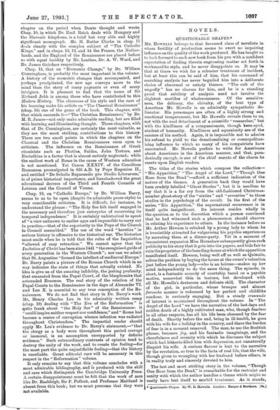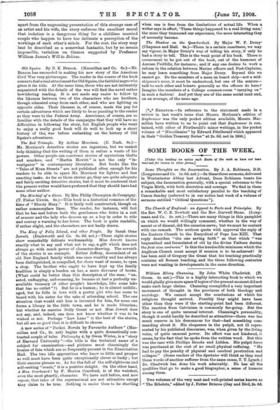NOVELS.
QUESTIONABLE SHAPES.*
Ma. HOWELLS belongs to that favoured class of novelists in whom fertility of production seems to exert no impairing influence on the quality of the work produced. He has taught us to look forward to each new book from his pen with a confident expectation of finding therein engrossing matter set forth in workmanlike style, and he never disappoints us. It may be that at times we wish for a robuster treatment of incident, but at least this can be said of him, that his command of searching analysis has never beguiled him into a deliberate choice of abnormal or unholy themes. "The cult of the ungodly " has no charms for him, and he is a standing proof that subtlety of analysis need not involve the slightest sacrifice of wholesomeness. Of the sensitive- ness, the delicacy, the chivalry, of the best type of American Mr. Howells is an admirably sympathetic de- lineator. His personages are often of a highly strung and emotional temperament, but Mr. Howells reveals them to us, not with the cool detachment of a scientific " researcher," but with the kindliness of a compassionate, though keen-eyed, student of humanity. Kindliness and equanimity are of the essence of his method. Again, it is impossible not to admire his refusal to yield to the denationalising or cosmopolitan- ising influence to which so many of his compatriots have succumbed. Mr. Howells prefers to write for Americans about Americans in the American manner, and that, para- doxically enough, is one of the chief secrets of the charm he exerts upon English readers.
The titles of the stories which compose the collection- " His Apparition," " The Angel of the Lord," " Though One Rose from the Dead" —afford a sufficient indication of the nature of the themes. A generation back they would have been crudely labelled "Ghost Stories"; but it is needless to say that it is a far cry from the old-fashioned Christmas- number ghost-story of the " sixties " and " seventies " to these studies in the psychology of the occult. In the first of the series, "Iris Apparition," the supernatural occurrence is in itself quite insignificant. Its interest resides wholly in the question as to the discretion which a person convinced that he had witnessed such a phenomenon should observe in relating his experience to others. In the instance before us Mr. Arthur Hewson is rebuked by a young lady to whom he is irresistibly attracted for vulgarising his psychic experiences by narrating them at a dinner-party. Yet in a moment of inconsistent expansion Miss Hernshaw subsequently gives such publicity to his story that it gets into the papers, and bids fair to ruin theproprietor of the boarding-house at which the apparition manifested itself. Hewson, being well off as well as Quixotic, solves the problem by buying the house at the owner's valuation just before the young lady—who is an heiress—makes up her mind independently to do the same thing. The episode, in short, is a fantastic comedy of courtship based on a psychic motive, somewhat thin in texture, but developed with all Mr. Howells's dexterous and delicate skill. The character of the girl, in particular, whose brusque and almost farouche manner is redeemed by her perfect and childlike candour, is curiously engaging. But a steady crescendo of interest is maintained throughout the volume. In " The Angel of the Lord " we have the narrative of the last days and sudden death of a highly cultivated man, who, though fearless in all other respects, has all his life been obsessed by the fear of death. Shortly before the end, being in ill-health, he goes with his wife for a holiday in the country, and there the burden of fear is in a moment removed. The man, to use the Scottish phrase, becomes fey, and his fantastic imaginings, and the cheerfulness and serenity with which he 'discusses the subject which had hitherto filled him with depression, not unnaturally disquiet his wife. A curious flavour is lent to the narrative by the revelation, so true to the facts of real life, that the wife, though given to wrangling with her husband before others, is in reality truly and sincerely devoted to him.
The last and most striking story in the volume, "Though One Rose from the Dead," is remarkable for the restraint and sanity with which the author handles a theme which might so easily have lent itself. to morbid treatment. As it stands, • Questionable Shapss. By W. D. Howells. London. Harper I Brothers. Rs.)
apart from the engrossing presentation of this strange case of an artist and his wife, the story enforces the excellent moral that isolation is a dangerous thing for a childless married couple who happen to have too intimate a perception of the workings of each other's minds. For the rest, the story may best be described as a somewhat fantastic, but by no means impossible, variation on themes suggested by Professor William James's Will to Believe.























































 Previous page
Previous page